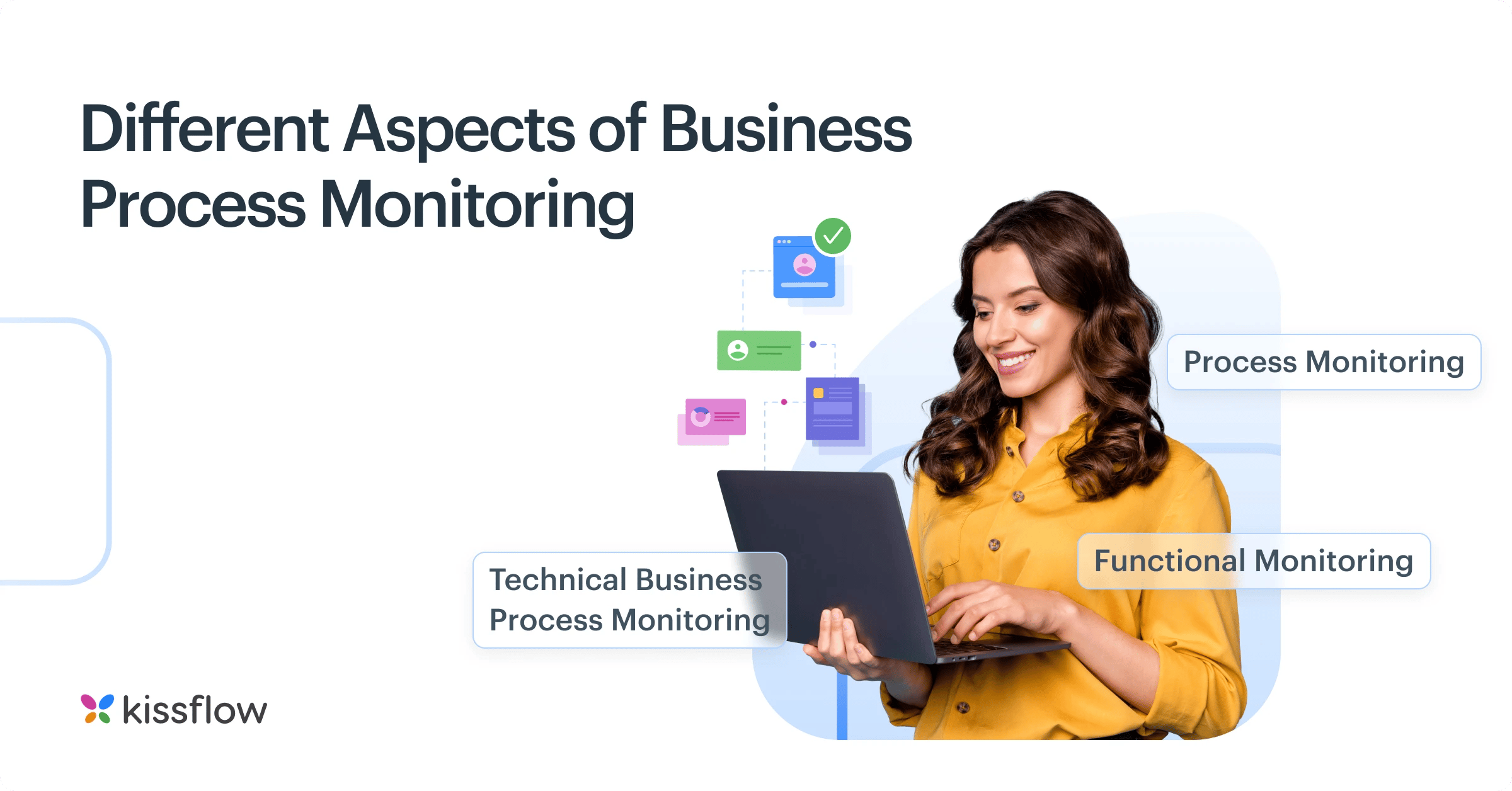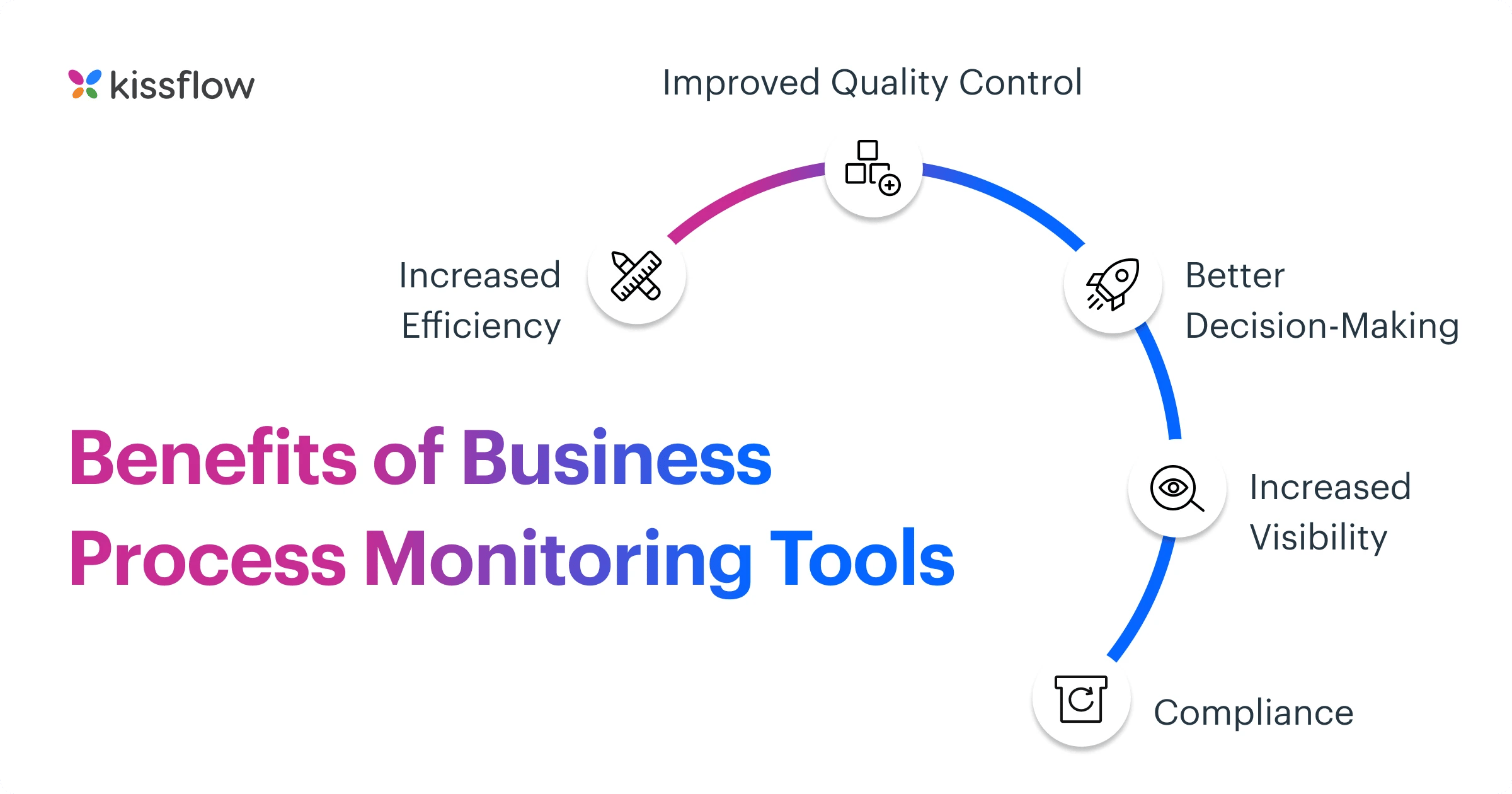Enterprises today contain a significant number of different business processes across various areas and functions. But as these processes become larger and more diversified, complexities inevitably arise. Constant business process monitoring becomes essential to keep operations on track.
By continuously monitoring business processes, you can analyze performance, address potential issues, and make informed decisions about process improvements.
What is Business Process Monitoring?
Business tracking monitoring is the activity of reviewing and analyzing the performance of such processes to identify successes and problems. Monitoring is an integral part of the business process management (BPM) lifecycle. BPM monitoring is usually carried out via software known as a business process monitoring tool (BPM monitoring tool).
Different Aspects of Business Process Monitoring
The concept of business process monitoring covers such a broad scope, potentially looking at activities within every aspect of the business. To achieve success within business process monitoring, a structured approach is needed.

1. Functional Monitoring
Functional monitoring as part of BPM involves taking a specific business application and reviewing how it is performing its role within a specific process or part of the business. Functional monitoring as part of BPM monitoring is an effective way of detecting any problems or blockages within a system or process. However, its findings need to be applied within the broader business context in order to find potential solutions and make improvements.
2. Technical Business Process Monitoring
Technical business process monitoring has a slightly different definition, in that it is primarily responsible for analyzing the performance of specific systems, software, or equipment. Technical monitoring is quite a popular activity in many organizations, especially with those who are keen to check that their return on investment is healthy and that their systems are operating as efficiently as possible.
3. Process Monitoring
Process monitoring is a more comprehensive type of BPM, as it encompasses the whole spectrum of activities and workflows that exist in a business. It compares the performances of systems, equipment, and software and how they integrate and work within a whole process. It’s an essential part of business process monitoring as a whole.
The Need for Business Process Monitoring
How can business process monitoring help your organization succeed?
- First, BPM monitoring is the ideal way to set out all of your business processes and compare performance across them. It picks up duplications or repetitive tasks and identifies problems that cause performance issues, allowing you to take concrete steps to make improvements and track progress. This is one of the critical reasons why BPM monitoring can be so effective.
- Most businesses rely on a great number of processes across different departments to run effectively. However, it’s not enough to put a process in place and then leave it running.
- It’s vital to undertake regular “health checks” of your processes by carrying out BPM monitoring. After all, so many things change on a daily, weekly, and monthly basis, and your processes need to keep up with this so that they accurately reflect your business operations. BPM monitoring can support your business to make this happen.
Key Benefits of Business Process Monitoring Tools
Business process monitoring tools can provide a number of benefits for businesses, including:

1. Increased Efficiency
By monitoring business processes in real-time, companies can identify and address bottlenecks or inefficiencies that may be slowing down the process.
2. Improved Quality Control
With monitoring tools, businesses can track key performance indicators (KPIs) and identify areas where quality may be lacking, allowing them to take corrective action.
3. Better Decision-Making
Business process monitoring tools can provide managers with real-time data that can be used to make more informed decisions about the business.
4. Increased Visibility
These tools give a clear view of how business processes are functioning and can provide insights into areas that need improvement.
5. Compliance
Many industries have specific regulations that must be met, by using these tools, you can ensure that your business is meeting compliance requirements.
6. Cost Savings
By identifying inefficiencies and improving processes, businesses can reduce their operating costs and increase their bottom line.
Business Process Monitoring Tools are Key to Your Organizational Success
BPM tools are a great way to give your leadership team greater insight into the workings of your business processes. Using business process monitoring tools allows your organization to accurately reflect the operational activities and priorities of their teams and contribute positively towards the broader business strategy and goals of the company.
How Kissflow Can Help With Your BPM Needs
It’s easy to keep your business process monitoring up to date when using Kissflow’s low-code platform.
Kissflow allows you to create personalized workflows with minimal coding. You can directly create or improve new processes with the visual drag-and-drop form builder.
The powerful reporting capabilities make monitoring process performance and data-driven decisions easier. Kissflow’s range of reporting features offers an effective way to get a snapshot of performance across each process for BPM purposes, allowing users to address and rectify problems.
Solve your workflow challenges with Kissflow and optimize your team's productivity.
Frequently Asked Questions:
1. How does monitoring improve process efficiency?
Monitoring improves process efficiency by providing real-time visibility into performance, identifying bottlenecks as they occur, enabling data-driven optimization decisions, ensuring compliance with established procedures, providing early warning of potential issues, supporting resource allocation decisions, and creating accountability through transparency and measurement.
2. What tools help businesses track key workflow metrics?
Tools that help businesses track key workflow metrics include process mining platforms identifying actual process flows, business intelligence dashboards visualizing performance data, workflow analytics suites measuring cycle times and throughput, exception tracking systems highlighting problem areas, resource utilization monitors, SLA compliance trackers, and predictive analytics identifying potential bottlenecks.
3. What industries rely on process monitoring?
Industries relying on process monitoring include manufacturing (production quality, equipment utilization), utilities (service delivery, infrastructure performance), financial services (transaction processing, compliance), healthcare (patient flow, resource utilization), and transportation (fleet management, delivery performance). Organizations with high-volume operations or stringent service level agreements particularly benefit.
4. How does AI enhance business process monitoring?
AI enhances business process monitoring by detecting anomalies that indicate potential issues, predicting bottlenecks before they impact performance, automatically classifying exceptions for appropriate handling, providing real-time insights through natural language interfaces, optimizing resource allocation based on current conditions, identifying patterns in process execution, and continuously learning from historical data to improve future recommendations.
5. What are best practices for monitoring business workflows?
Best practices for monitoring business workflows include establishing clear KPIs aligned with business objectives, implementing real-time dashboards providing visibility to appropriate stakeholders, setting up automated alerts for exceptions and threshold violations, conducting regular performance reviews, comparing actual versus expected performance, tracking trends over time, and using monitoring insights to drive continuous improvement initiatives.



